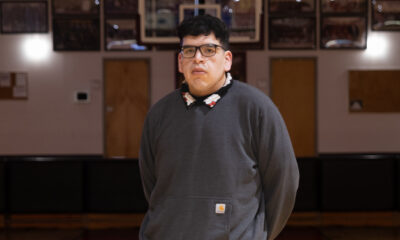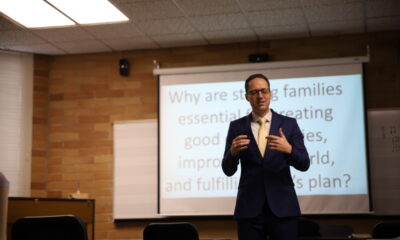In Northern Idaho, guns are nearly as common as pine trees, used for recreation and personal defense. With seven shooting ranges within an hour’s drive of Coeur d’Alene, gun owners can easily find a place to shoot or get lessons. Local businesses cater to new and experienced gun owners: Cabela’s in Post Falls even offers a “Ladies’ Intro to Handguns” class.
Larkin Henkel knows a thing or two about guns. The founder and president of the NIC Breaking Clays shooting club, Henkel has been shooting for 10 years. She shoots handguns and rifles for fun, but she only competes with shotguns.
Gun owners are a diverse crowd: At the Coeur d’Alene Skeet and Trap Club where she works, Henkel said she has seen air marshals, attorneys, school teachers, and even a little old lady who was interested in learning to shoot a large shotgun that she’d bought for home defense.
Even as an avid shooter and gun owner, Henkel said she believes in reasonable gun control measures.
“I feel that everyone should have to register their guns, even if you buy it from someone else, even if you don’t go through an actual gun retailer,” said Henkel, 18, political science, Coeur d’Alene. “You should have to register, just like if you were to buy a car…. You should have to get background-checked. People who want to buy higher-up guns should have to have a mental stability test to make sure that they’re mentally competent in owning that firearm.”
Some types of ammunition should be unavailable, Henkel said, such as armor-piercing and high-velocity rounds.
“No one is going to need those,” she said. “If you’re a hunter, you’re not going to carry around a gun with 15 to 50 rounds in it. That’s just not safe for a hunter to be doing that…. It’s not a hunter or a sportsman’s view on it.”
Many gun owners who advocate access to high-velocity rounds, armor-piercing rounds and large clips aren’t hunters or sportsmen, Henkel said. Instead, they tend to be owners who want to prepare themselves for a government takeover or an overturning of the Second Amendment.
“Being a political science major, there’s no way a President or Congress or anyone could take away someone’s Bill of Rights,” Henkel said. “I don’t know how people can even believe that a President would want to take away their Constitutional rights. That’s what I don’t understand.”
Not all gun owners agree, however.
“Reasonable gun control, in my mind, is already in place,” said Nate England, 20, general studies, Coeur d’Alene. “I think the (National Instant Check System) background checks are good enough, but stiffer penalties need to be carried out. People walk on crimes when they shouldn’t all the time.”
England comes from a family that includes many members of the military. He’s helped out at a local gun shop and enjoys target shooting. A collector of semiautomatic military-style rifles, England said he keeps weapons for target shooting, home defense, and simply because he can.
“It’s a joy to shoot,” he said. “It’s a freedom we possess.”
In recent weeks, proponents of gun rights have often said, “The only thing that stops a bad guy with a gun is a good guy with a gun.” England said there’s a lot of truth to those words.
“We, as citizens, are given the responsibility to defend ourselves against what might happen,” he said. “I think that if somebody is going to come into a classroom with a gun, there needs to be somebody to curb that threat.”
However, England said he doesn’t believe that arming teachers is the solution to school shootings. Having police present in schools would reduce gun violence, he said.
“Police officers are trained for that kind of escalation in violence,” England said. “If there’s going to be a threat, I don’t think it should be a teacher responding to it. What kind of message does that send to children?”
In Henkel’s opinion, the key to reducing gun violence is education. Children don’t learn basic gun safety in school, but they should.
“I think that would help decrease a lot of gun violence in the country,” she said. “Having an understanding of what a gun actually is and making sure everyone is always safe.”
Other countries have gun control laws that are much stricter than in the United States. To obtain a gun in Japan, for instance, where only shotguns and air rifles are legal to own, prospective gun owners must take a day-long class and pass several tests; pass a mental health test and drug test; and pass a thorough background check. Guns and ammunition must be locked and stored separately, and owners must provide police with the specific locations of both.
In 2008, there were just 11 gun-related homicides in Japan, according to gunpolicy.org. In 2010, there were 31,672 gun-related deaths in the United States.
England said he doesn’t think the United States should look to other countries’ gun laws as an example.
“I think we would do much better if we would stop comparing ourselves to other countries, trying to copy their gun control policies,” he said. “I think we need to find our own way. Our country used to be a country of innovation. Other countries looked up to us. Right now, we’re comparing ourselves to other countries, which I don’t think is the best route.”
The real problem, England said, is “the decay of society.”
“I think it ultimately comes down to, if somebody possesses a gun, what’s in their heart,” he said.














